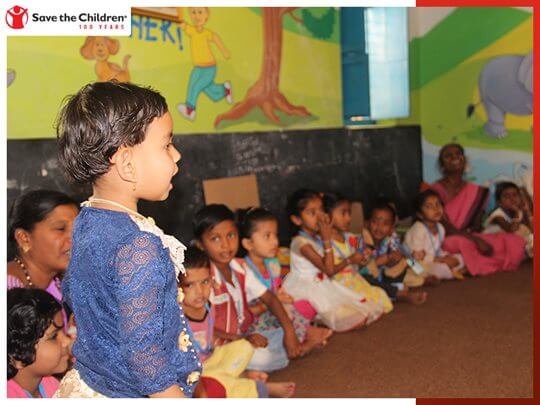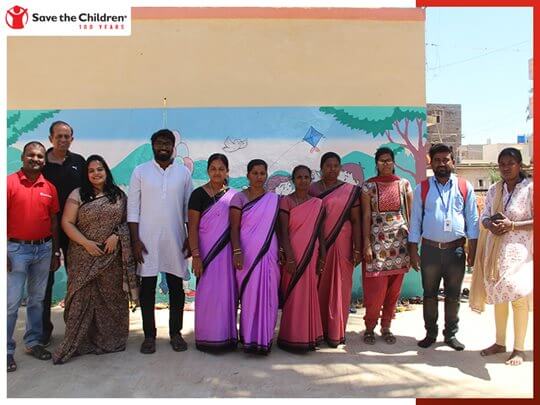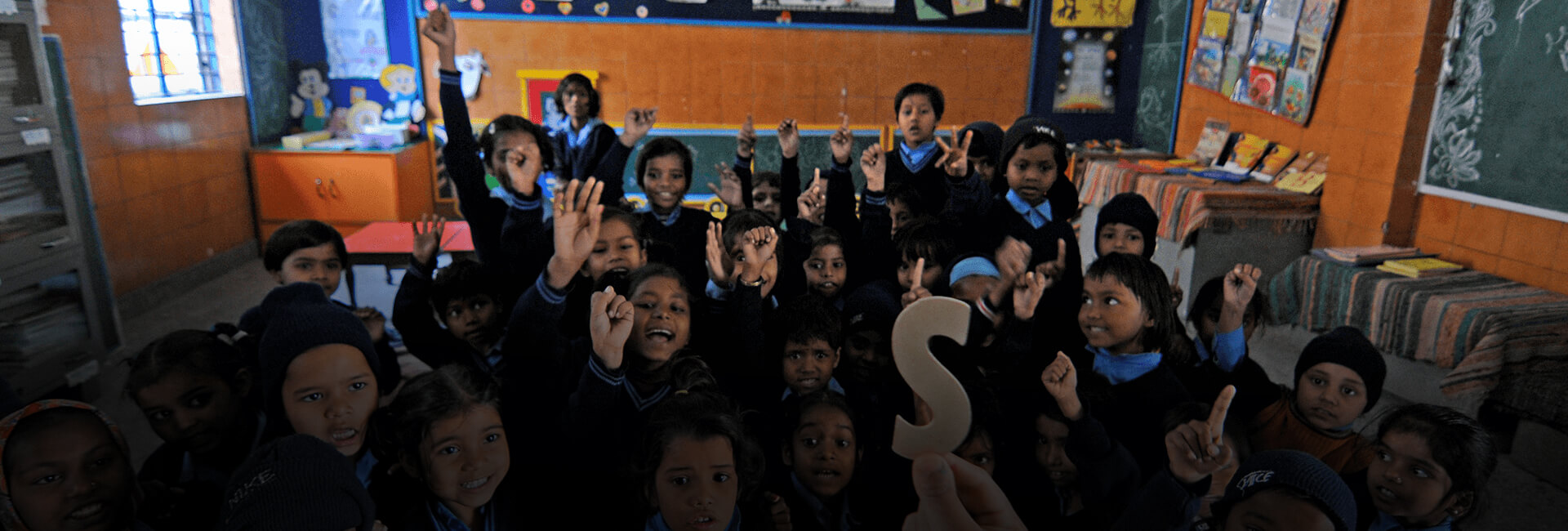Ensuring the right start for young children of bengaluru
By Devendra Tak, Head of Media & Communications, Bal Raksha Bharat
The creation of Bal Raksha Bharat’s Model Hub Centre at Bashettihalli in Bengaluru (rural) has sparked unprecedented interest among the communities, teachers and children and created a true sense of ownership by the Panchayats. The Centre is transforming education for 3-6 year-olds across Karnataka. The activity is an important part of the 3-year-long Early Childhood Care and Education (ECCE) programme being run by Bal Raksha Bharat – in partnership with Makkala Jagriti – since July 2017. It will conclude in March 2020.

There are four core objectives of the project:
- Increase access to quality child-friendly learning environments in Anganwadi Centres
- Enhance the capacity of caregivers to provide a wholesome environment for children
- Advocate and engage with government and other stakeholders to establish minimum standards for quality Anganwadi Centres
- Establish a Hub or Model Anganwadi Centre to improve the quality of pre-school education programming
“Whenever we are asked to show something innovative for children or women to visitors, we take them first to see the Hub Centre,” says Ms. B.M. Nethravathi, a member of the village Panchayat. “The level of learning and creativity among the children has risen sharply. The success of the Hub Centre was a key component in the district being awarded the Gandhi Puraskar by the state government. It is a venue for many of our celebrations now and has become a landmark in the village. The Panchayat has decided that we will carry forward all the initiatives that Bal Raksha Bharat has initiated here,” he adds.
Surabhi Chatrapathy, Quality Coordinator, Makkala Jagriti, is mighty happy with the results achieved. “The best part is that we have witnessed a lot of community involvement. For instance, participation of mothers in the monthly meetings has gone up. Teachers now grasp the concepts of pre-school education much better. They always knew it was important but through our intervention they have understood why it is important. They know that brain development is happening but what happens as a consequence of brain development and why this is so important is more clear to them now,” she says.

When one looks at the project from the viewpoint of sustainability, a greater degree of ownership is observed. Since there is a heightened level of awareness around best practices to be followed on Early Childhood Care and Development, all involved stakeholders now know how to prioritise the efforts around it. The idea that learning has to always happen in an established space with a qualified teacher has changed. Now parents say that even they can help in teaching children.”
Das Antoni, Project Coordinator, Makkala Jagriti, who has been hands-on with the project has experienced its remarkable daily progress. “We have tried to connect different stakeholders – not just Anganwadi teachers and helper but also the community, the parents (we are trying to involve the fathers also) and of course. There is a lot of community involvement now, after the involvement of the Anganwadi teachers increased and the results were obvious to everyone.
“There is a schedule which Integrated Child Development Services (ICDS) has given, which was that the mornings were for Pre-School Education activities at AWCs and afternoons for community work by teachers. Initially teachers were updating their registers, community work etc. in PSE hours. We communicated to the community that teachers are at PSE in the morning (9:30 am to 1 pm) and that they should be kept busy with PSE activities only at that time. We did a lot of Capacity building trainings for teachers and gave them lots of exposure. We are getting a lot of media attention where the teachers were projected. Through technology integration, creation of WhatsApp group etc. they are getting appreciation directly including their supervisors, CDPO and DD-WCD. Two things we figured out was that motivation (which was really missing) and also knowledge — every year there should be trainings which we have been giving – need to be enhanced for the teachers to be able to do their work in a stronger way. Without essential knowledge, teachers were unable to integrate the learnings that they needed to impart to children.
“The Hub Centre has really become a hub of activities: we get all the Anganwadi teachers here for the capacity building trainings on Fridays and Saturdays. Teachers and helpers from other Anganwadis have made visits to the Hub to get exposure to it. There are four Anganwadis (Bashettihalli-2, Bashettihalli-3, Vijayanagar and Vinayaka Nagar) attached to this centre and so when the teachers there see what is happening here they realize that they could replicate the same things too.
“Over the last 3 months we are covering the brain development aspects. Anganwadi parents are trained to do activities at home, as we have introduced ELM at home. Because of this, their involvement has increased. We have full-day separate workshops for parents, not just meetings. We have conducted three workshops so far in this year, which will be total of eight as we did four last year and one more coming up this year. We have also had 8 workshops for parents.
“Earlier, the parents would say we do not have any tools at home to do teaching, now they eagerly find household items to carry on the child’s learning.
“Community engagement and support of the Panchayat is most visible during days that we mark some celebrations at the Hub Centre. The centre’s gate, door replacement, by concerned Panchayats. toilet renovation and new toilet construction made by the Councillor from Doddaballapur town municipality. It is difficult for Angwanwadi teachers to explain to Panchayat but when we go with them they say that these people are working for us so even we should do something. In some cases, the Panchayat did not even know that they already had money for the Anganwadi. Now we can expect continued support from the Panchayats.
“All the 52 Anganwadis, we’ve noticed, need different interventions. We have chosen 12 centres from the Anganwadis to make into models. We have divided these Anganwadis into four categories: A category is where the teachers and community are involved, we don’t have to be present all the time; B category is Ok; C and D require more intervention.”
Hanamant Bhajantri, Save’s project officer, informs: “When we began the project in June 2017, initially, there was a lot of discomfort among the teachers and the community. At that time, the Anganwadis had many challenges when we started, as Mathrupoorna scheme had been introduced which were really keeping the teachers very busy. NGOs were not trusted earlier. They could not foresee this kind of transformation that we did, and then they ensure the support we needed and will ensure the sustainability. But when we held sessions to explain what was being done, then everyone understood what we were doing and they became comfortable.
“Over time, the Panchayats’ support has become steady — we are working with 15 panchayats for 52 Anganwadis, they all know what we are doing. When we created this Hub Centre, the panchayat was not much involved with it – today, they have proudly taken/ensured complete ownership of it.
“This hub centre was a dump yard, people would throw garbage here before we intervened. Panchayat supported by cleaning the area, doing the initial painting of the building, constructed a new toilet and provided water, electricity and fans. 78 children are benefitted at this Centre in the first year.
“Parents involvement is now very high and children enrollment is high. In June 2019, there were just 40 children in the four Anganwadis here, the number has gone up to 116.

“We have created 5 corners in the center – Art and Music, Numeracy, Literacy, Science and Development. When the child is at home, they must give more time to child to help improve Literacy, numeracy skills at home as well.
“We have created a child profile bag. All the activities a child does goes into the bag. When the child leaves the Anganwadi after one or two years, the child will take the bag to home and the parents can see what the child has learnt.
“There are some challenges that still remain: and the biggest one is to maintain the staff. Lack of transport is a major inconvenience for the cluster coordinators and there is high staff turn-over.
“We have already accomplished our Goal – which was to demonstrate to authorities to replicate such a centre across the whole state. Hopefully ECCE is here to stay!”




